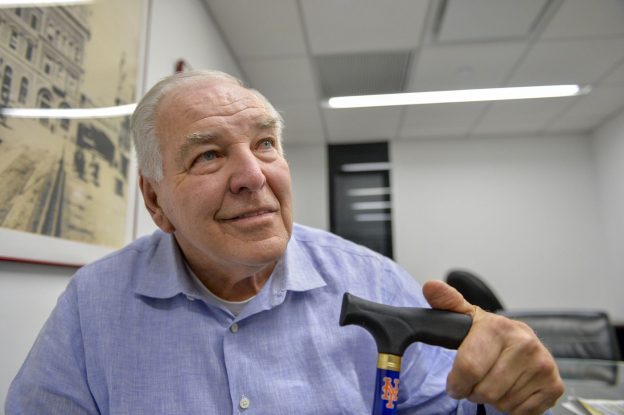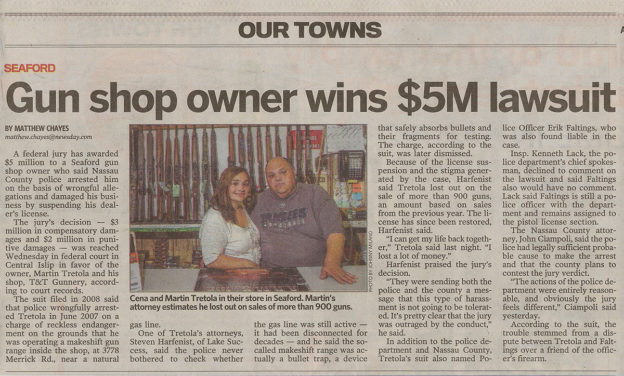NASSAU COUNTY, NY – Harfenist Kraut & Perlstein LLP has secured a substantial verdict in favor of their client Sunita Shah, a Long Island woman whom Nassau County police arrested without probable cause and subjected to a humiliating media circus over a battery of drug crimes she clearly did not commit. The $500,000 award secured on Ms. Shah’s behalf is a significant figure for a false arrest case and underscores the severe harm she was made to suffer by police looking to obtain media attention for the recovery of a synthetic marijuana manufacturing operation. Moreover, it serves as a strong rebuke of Nassau County Police Department’s behavior towards upstanding members of the community and its cavalier “arrest first, investigate later” attitude.
“This was an arrest that should never have happened, said Steven Harfenist, who tried the case on behalf of Mrs. Shah. “There was simply no evidence that Mrs. Shah had anything to do with the drugs, and despite numerous members of the Nassau County Police Department being present at the scene, not one could identify who authorized the arrest. Fortunately, the jury understood what happened and the damage caused to Sunita.”
Shah’s ordeal began on October 4, 2017, and it would not end until over six years later. That afternoon, her husband, Rajesh, received a call about a Williston Park property he owned and rented out. The owner of the business next to Rajesh’s property told him they had noticed a strange gas-like smell coming from the basement and had alerted the fire department. The Shahs left their friend’s house, where they had been planning their daughters’ wedding, and drove to the property to help firefighters with their investigation.
Sunita waited in the car while Rajesh unlocked the door and let the firefighters into the building. Twenty minutes had gone by without his return, so Sunita decided to check on her husband. She walked upstairs to find that her husband and the firefighters had been joined by several police officers, who were there to investigate the source of the odor. Rajesh informed the police that while he owned the property, he rented it out through a third party and was unaware of any potentially illicit activity taking place there, providing them with a copy of the lease as evidence. Rajesh called his renter to clear things up, but the renter abruptly hung up when Rajesh explained the situation.
Police discovered the reason for the renter’s reticence when they entered the basement: more than 20 pounds of loose synthetic cannabis and 5,300 bags containing more of the substance, for a total estimated street value of $250,000. Thrilled by their find, the officers were quick to arrest both the Shahs despite having no evidence that either had ever even set foot in the basement. Crucially, Sunita’s name wasn’t on the building’s title, nor did she have a key to the property. The Shahs were both charged with criminal possession of a controlled substance, second-degree reckless endangerment, and illegal use of nitrous oxide, then subjected to a “perp walk” in front of a media circus staged for the occasion. Yet even as the department took its victory lap for its bust, the case against the Shahs began to unravel.
Not only did police fail to uncover any evidence linking the Shahs with the synthetic drugs, but the officers at the scene offered wildly conflicting accounts of what had happened. Two claimed that firefighters needed to break down the door to access the property; firefighters maintained Rajesh had let them into the property voluntarily. One officer claimed that it was Sunita who had unlocked the door, not Rajesh. There was even disagreement over who had shown officers the lease, with at least one claiming it had been Sunita, seemingly an attempt to tie her to the crime.
Given the complete lack of evidence against the Shahs or even a coherent story from the investigating officers, the prosecution was forced to dismiss its case and drop the charges. But it would take another six years for Sunita to finally receive her vindication in court – and even though the jury awarded her a substantial recovery for a false arrest case, nothing can truly make Sunita whole for what she suffered.
News of Sunita’s arrest and her mugshot remain embedded in the internet. There is, as yet, no countervailing narrative available to the public, nothing online about how the charges against her proved false. The sad fact is that no amount of money can undo the reputational damage she has suffered and continues to suffer because police were overeager to make a collar. Perhaps, as she and others hold police departments accountable for their behavior, Sunita can force officers to think twice the next time they find themselves tempted to arrest first and ask questions later.
“Sunita was put through an unnecessary ordeal that will follow her for the rest of her life due to the nature of the internet,” Harfenist concluded. “This case should stand as a lesson to how decisions by police departments can permanently scar a person.”
About Harfenist Kraut & Perlstein LLP
Harfenist Kraut & Perlstein LLP is a New York law firm with offices in Lake Success and Purchase. While the firm’s litigation practice is varied and diverse—including corporate, insurance, real estate, estate, and matrimonial litigation—Steven Harfenist has long maintained a constitutional law practice involving First Amendment, false arrest, and malicious prosecution claims. Over the last 25 years he has represented both municipalities and individuals at trial in these highly complex claims.




